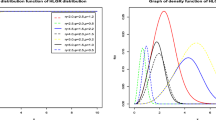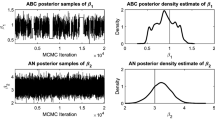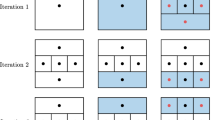Abstract
Mixtures of truncated exponentials (MTE) potentials are an alternative to discretization and Monte Carlo methods for solving hybrid Bayesian networks. Any probability density function (PDF) can be approximated by an MTE potential, which can always be marginalized in closed form. This allows propagation to be done exactly using the Shenoy-Shafer architecture for computing marginals, with no restrictions on the construction of a join tree. This paper presents MTE potentials that approximate standard PDF’s and applications of these potentials for solving inference problems in hybrid Bayesian networks. These approximations will extend the types of inference problems that can be modelled with Bayesian networks, as demonstrated using three examples.
Similar content being viewed by others
References
Cobb B. R. 2005. Inference and decision making in hybrid probabilistic graphical models, Doctoral dissertation, University of Kansas, School of Business, Lawrence, KS.
Cobb B. R. and Shenoy P. P. 2006. Inference in hybrid Bayesian networks with mixtures of truncated exponentials. International Journal of Approximate Reasoning 41(3): 257–286.
Cowell R. G., Dawid A. P., Lauritzen S. L., and Spiegelhalter D. J. 1999. Probabilistic Networks and Expert Systems, New York, Springer.
Demirer R. and Shenoy P. P. 2005. Sequential valuation networks and asymmetric decision problems. European Journal of Operational Research 169(1): 286–309.
Elvira Consortium 2002. Elvira: An environment for probabilistic graphical models, in Gámez J. A. and Salmerón A. (eds.), Proceedings of the First European Workshop on Probabilistic Graphical Models, Cuenca, Spain, pp. 222–230.
Kooperberg C. and Stone C. J. 1991. A study of logspline density estimation. Computational Statistics and Data Analysis 12: 327–347.
Kozlov A. V. and Koller D. D. 1997. Nonuniform dynamic discretization in hybrid networks. in Geiger D. and Shenoy P. P. (eds.), Uncertainty in Artificial Intelligence, 13: 314–325, San Francisco, Morgan Kaufmann.
Kullback S. and Leibler R. A. 1951. On information and sufficiency. Annals of Mathematical Statistics 22: 79–86.
Lasdon L. S. and Waren A. D. 1978. Generalized reduced gradient software for linearly and nonlinearly constrained problems, in Greenberg H. J. (ed.), Design and Implemetation of Optimization Software, Amsterdam, Sijthoff and Noordhoff, pp. 335–362.
Lauritzen S. L. 1992. Propagation of probabilities, means and variances in mixed graphical association models. Journal of the American Statistical Association 87: 1098–1108.
Lauritzen S. L. and Jensen F. 2001. Stable local computation with conditional Gaussian distributions. Statistics and Computing 11: 191–203.
Lauritzen S. L. and Spiegelhalter D. J. 1988. Local computations with propabilities on graphical structures and their application to expert systems. Journal of the Royal Statistical Society Series B 50(2): 157–224.
Lerner U. 2002. Hybrid Bayesian networks for reasoning about complex systems, Doctoral dissertation, Stanford University, Stanford, CA.
Lerner U., Segal E. and Koller D. 2001. Exact inference in networks with discrete children of continuous parents. in Breese J. and Koller D. (eds.), Uncertainty in Artificial Intelligence, 17: 319–328, San Francisco, Morgan Kaufmann.
MacKay D. J. C. 2003. Information Theory, Inference, and Learning Algorithms, Cambridge, United Kingdom, Cambridge University Press.
Moral S., Rumí R., and Salmerón A. 2001. Mixtures of truncated exponentials in hybrid Bayesian networks, in Besnard P. and Benferhart S. (eds.), Symbolic and Quantitative Approaches to Reasoning under Uncertainty, Lecture Notes in Artificial Intelligence, 2143: 156–167, Berlin, Springer-Verlag.
Moral S., Rumí R. and Salmerón A. 2002. Estimating mixtures of truncated exponentials from data. in Gámez J. A. and Salmerón A. (eds.), Proceedings of the First European Workshop on Probabilistic Graphical Models, Cuenca, Spain, pp. 135–143.
Moral S., Rumí R. and Salmerón A. 2003. Approximating conditional MTE distributions by means of mixed trees. in Nielsen T. D. and Zhang N. L. (eds.), Symbolic and Quantitative Approaches to Reasoning under Uncertainty, Lecture Notes in Artificial Intelligence 2711: 173–183, Berlin, Springer-Verlag.
Murphy K. 1999. A variational approximation for Bayesian networks with discrete and continuous latent variables. in Laskey K. B. and Prade H. (eds.), Uncertainty in Artificial Intelligence 15: 467–475, San Francisco, Morgan Kaufmann.
Poland W. B. 1994. Mixtures of Gaussians and minimum relative entropy techniques for modeling continuous distributions, Ph.D. Thesis, Department of Engineering–Economic Systems, Stanford University, Stanford, CA.
Rumí R. 2003. Modelos De Redes Bayesianas Con Variables Discretas Y Continuas, Doctoral Thesis, Universidad de Almeriá, Departamento de Estadística y Matemática Aplicada, Almería, Spain.
Rumí R. and Salmerón A. 2005. Penniless propagation with mixtures of truncated exponentials, in Godo L. (ed.), Symbolic and Quantitative Approaches to Reasoning under Uncertainty, Lecture Notes in Artificial Intelligence, 3571: 39–50, Berlin, Springer-Verlag.
Shenoy P. P. 1997. Binary join trees for computing marginals in the Shenoy-Shafer architecture. International Journal of Approximate Reasoning 17(2,3): 239–263.
Shenoy P. P. and Shafer G. 1990. Axioms for probability and belief function propagation. in Shachter R. D., Levitt T. S., Lemmer J. F., Kanal L. N. (eds.), Uncertainty in Artificial Intelligence 4: 169–198, Amsterdam, North-Holland.
Spiegelhalter D. J., Dawid A. P., Lauritzen S. L. and Cowell R. G. (1993), Bayesian analysis in expert systems. Statistical Science 8(3):219–283.
Author information
Authors and Affiliations
Corresponding author
Rights and permissions
About this article
Cite this article
Cobb, B.R., Shenoy, P.P. & Rumí, R. Approximating probability density functions in hybrid Bayesian networks with mixtures of truncated exponentials. Stat Comput 16, 293–308 (2006). https://doi.org/10.1007/s11222-006-8175-8
Received:
Accepted:
Issue Date:
DOI: https://doi.org/10.1007/s11222-006-8175-8




